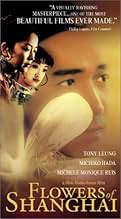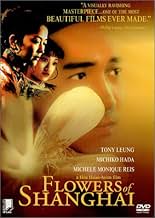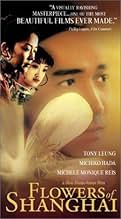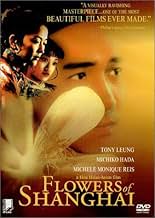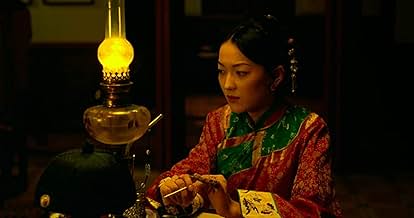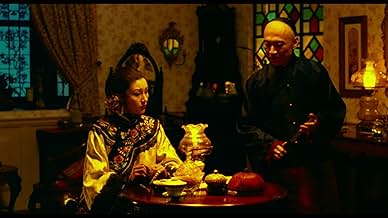CALIFICACIÓN DE IMDb
7.3/10
4.4 k
TU CALIFICACIÓN
Agrega una trama en tu idiomaIn the "flower houses" (upscale brothels) of Shanghai, various interweaving stories of love, loyalty, and deceit play out subtly.In the "flower houses" (upscale brothels) of Shanghai, various interweaving stories of love, loyalty, and deceit play out subtly.In the "flower houses" (upscale brothels) of Shanghai, various interweaving stories of love, loyalty, and deceit play out subtly.
- Dirección
- Guionistas
- Elenco
- Premios
- 6 premios ganados y 6 nominaciones en total
Tony Leung Chiu-wai
- Wang Lingsheng
- (as Tony Chiu Wai Leung)
Michelle Reis
- Emerald
- (as Michelle Monique Reis)
Carina Lau
- Pearl
- (as Carina Lau Ka-ling)
Rebecca Pan
- Huang
- (as Rebecca Pan Wan-ching)
Tony Chang
- Peking Opera Actor
- (as Tony Chang Ruei-che)
Yiu-Ming Lee
- Azhu
- (as Yu-ming Lee)
- Dirección
- Guionistas
- Todo el elenco y el equipo
- Producción, taquilla y más en IMDbPro
Opiniones destacadas
10dave-593
Hou Hsiao-Hsien's "Flowers of Shanghai" is an opium dream of a movie: visually and aurally there is no mistaking that this is the work of an artist with the imagination of a poet, and the precision of a clockmaker. The opening shot is among the most exquisite in all of cinema: a veritable tour de force that exudes Hou's love for the film medium, but is decidedly restrained and controlled, never allowing style to upstage the narrative and degenerate into mere spectacle. In keeping with the film's setting and rules of patriarchy, the major male characters are introduced first. The women serving these men are then introduced in the following "chapters", each one preceded by title cards announcing their names and place of residence as if gently mocking or subverting the patriarchical order.
This chamberpiece drama of sexual intrigue and power struggle is astonishingly acute in capturing the feel and sensibilities of the late 19th century but expressed in very contemporary terms without any apparent compromises or contradictions. The painterly colors of "Flowers" may invite comparison with Dutch masters like Vermeer even when Hou is deliberately conjuring an idealized world that is as hermetic as it is artificial: a world composed entirely without natural light is like a dream, hauntingly beautiful and intense but impossible to hold or to keep. That the film is shot entirely indoors and the mise-en-scene is orchestrated without any close-ups is a testament of Hou's faith and supreme confidence in creating a work that remains completely cinematic while averting the pitfalls of feeling stage bound. Despite the subject matter what is also startling is the complete absence of physical sex on screen; and, yet the film manages to sustain an erotically charged atmosphere.
Beginning with "The Puppetmaster" Hou has been increasingly moving towards a more minimalist form of cinema, stripping the narrative of everything that is superfluous until nothing is left but its emotional core, naked and unadulterated. "Flowers" is very much an interior film that does not depend on voiceover narration to make thoughts explicit. Hou's almost static camera continues to favor long medium takes ranging from 5 to 7 minutes, framing key characters sharing the same space and time, but well within reach of each other, capturing the subtle interplay and nuances while allowing them to drift in and out of the picture frame according to their relative importance in the social hierarchy. In this manner an entire community is evoked: demonstrating that the window to the world is precisely through the interior lives of individuals responsible for shaping the body politic.
This chamberpiece drama of sexual intrigue and power struggle is astonishingly acute in capturing the feel and sensibilities of the late 19th century but expressed in very contemporary terms without any apparent compromises or contradictions. The painterly colors of "Flowers" may invite comparison with Dutch masters like Vermeer even when Hou is deliberately conjuring an idealized world that is as hermetic as it is artificial: a world composed entirely without natural light is like a dream, hauntingly beautiful and intense but impossible to hold or to keep. That the film is shot entirely indoors and the mise-en-scene is orchestrated without any close-ups is a testament of Hou's faith and supreme confidence in creating a work that remains completely cinematic while averting the pitfalls of feeling stage bound. Despite the subject matter what is also startling is the complete absence of physical sex on screen; and, yet the film manages to sustain an erotically charged atmosphere.
Beginning with "The Puppetmaster" Hou has been increasingly moving towards a more minimalist form of cinema, stripping the narrative of everything that is superfluous until nothing is left but its emotional core, naked and unadulterated. "Flowers" is very much an interior film that does not depend on voiceover narration to make thoughts explicit. Hou's almost static camera continues to favor long medium takes ranging from 5 to 7 minutes, framing key characters sharing the same space and time, but well within reach of each other, capturing the subtle interplay and nuances while allowing them to drift in and out of the picture frame according to their relative importance in the social hierarchy. In this manner an entire community is evoked: demonstrating that the window to the world is precisely through the interior lives of individuals responsible for shaping the body politic.
At the end of the 19th century, Chinese officials used to spend their leisure time in lush brothels in the British concession of Shanghai. Hou Hsiao-Hsien's 'Hai Shang Hua' depicts the intricate social network sustained in those premises by the customers, the girls (called flowers) and the Madams. The personal relations in those brothels were ruled by pleasure, money, love and social status in a perfect parallel to the 'outside' society, which, in turn, is perceived throughout the film almost as unreal. Hou is a master creating ambiences: the film transmits an extraordinarily subtle feeling of warmth and suffocation fostered by a miraculous music. With neither a beginning nor an end, this superb film is not apt for those looking for adventures and easy-to-tell stories.
"Flowers of Shanhai" is a stunningly beautiful film, elegantly visualized and intriguingly scripted. It explores not only the conflicts between individuals, but also issues of gender and class, and the way in which the people in power find their lives eroding under the influence of opium, foreign currency, and the buying and selling of sexual favors and social influence. The intricate connections between older and younger businessmen, older and younger courtesans, masters, mistresses, and servants, and people of differing degrees of wealth and influence, are all examined as prostitutes try to buy their freedom, or find reasons for staying in the brothels even when someone wants to buy their freedom for them, and as both men and women fix themselves on paths to self-destruction.
Calling it too slow paced for a modern audience rather misses the point. Certainly there aren't many car chases or gunfights in it, and if one defines pace only in terms of physical action, it might be fair to call it slow. For audiences with an attention span of longer than 60 seconds and an interest in psychological action rather than physical action, it moves right along. In fact, I found myself having to rewind and view several scenes again because they developed too fast for me to follow as I took in the subtitles. I was very pleased at its lack of Hollywoodism. It's the kind of film "Age of Innocence" might have been if "Age of Innocence" had relied more on acting and less on posing in its cultivation of emotional intensity. In "Flowers of Shanhai," melodramatic action is depicted as a weakness displayed by characters, rather than being exploited as a way of sustaining the audience's interest in a character-based story in which the director has no confidence.
Calling it too slow paced for a modern audience rather misses the point. Certainly there aren't many car chases or gunfights in it, and if one defines pace only in terms of physical action, it might be fair to call it slow. For audiences with an attention span of longer than 60 seconds and an interest in psychological action rather than physical action, it moves right along. In fact, I found myself having to rewind and view several scenes again because they developed too fast for me to follow as I took in the subtitles. I was very pleased at its lack of Hollywoodism. It's the kind of film "Age of Innocence" might have been if "Age of Innocence" had relied more on acting and less on posing in its cultivation of emotional intensity. In "Flowers of Shanhai," melodramatic action is depicted as a weakness displayed by characters, rather than being exploited as a way of sustaining the audience's interest in a character-based story in which the director has no confidence.
10pcg
This hypnotically beautiful film may recall a dream, but the material world of money and power, indentured servitude and beatings everywhere intrudes on it. We discover in the contrasting stories of Emerald, Pearl, Crimson, Jade, and Crystal, how some survive as "flower girls" and others are crushed. Far from being boring or cold, the film is compelling dramatically and emotionally. "Flowers of Shanghai" seems to contain boundless reserves of sadness and rage -- it is as if the sex and violence are not on screen because Hou cannot bear to show them. If "Flowers of Shanghai" is an opium dream, as many have said, the opium is both bringing pleasure and suppressing pain.
"Flowers of Shanghai" shows compassion for its characters, both the innocents and those who survive through cynical manipulation. The scene-length takes in medium shots work to establish respect for each person within the film, while at the same time bringing about a kind of "rectification of names," systematically exposing the hypocrisy of the brothels. It's appropriate that one of the few moments of violent action in the film occurs when Master Wang smashes the exquisite interior decoration in a room: "Flowers of Shanghai" shows the seductive beauty of the brothel then reveals it to be a cage. Everyone in the film is on multiple levels unfree: the women are financially bound to the brothels and dependent on the whims of their clients, and almost everyone is addicted to opium.
The film never leaves the brothels. This expresses how the brothels in fact own the women. However, as Stephen Teo noted in CinemaScope, there's another detail that's easy to overlook: the women's bound feet prevent them from easily walking more than a few feet.
"Flowers of Shanghai" shows compassion for its characters, both the innocents and those who survive through cynical manipulation. The scene-length takes in medium shots work to establish respect for each person within the film, while at the same time bringing about a kind of "rectification of names," systematically exposing the hypocrisy of the brothels. It's appropriate that one of the few moments of violent action in the film occurs when Master Wang smashes the exquisite interior decoration in a room: "Flowers of Shanghai" shows the seductive beauty of the brothel then reveals it to be a cage. Everyone in the film is on multiple levels unfree: the women are financially bound to the brothels and dependent on the whims of their clients, and almost everyone is addicted to opium.
The film never leaves the brothels. This expresses how the brothels in fact own the women. However, as Stephen Teo noted in CinemaScope, there's another detail that's easy to overlook: the women's bound feet prevent them from easily walking more than a few feet.
This movie was absolutely brilliant.
It was filmed in a manner that makes it seem more realistic than most movies. Each frame is beautiful.
A note on dialect - This movie (with the exception of Leung to his mistress) is in Wu Chinese. Wu is hardly a minor language, spoken by well over 70 million people worldwide. It is spoken not only in Shanghai (the largest city in China) but the surrounding provinces, including such large cities as Suzhou and Wenzhou. It is actually more widely spoken than Cantonese and Taiwanese combined, making it the second-most-spoken variety of Chinese, dwarfed only by Mandarin. (70 million speakers is a lot of people; many national languages in Europe have fewer speakers) However, Wu is not spoken by as many overseas Chinese as are Cantonese, Mandarin, and Hokkien (aka Taiwanese, Minnan, etc), and for that reason less Westerners speak it. (in addition, Cantonese, Hokkien, and Mandarin are all the primary languages of at least one self-ruling political unit, even though the former two have less speakers than Wu)
This is the only well-known movie with dialogue primarily in Wu, and it is based on the 19th century Wu novel by the same name (except read as Wu).
It was filmed in a manner that makes it seem more realistic than most movies. Each frame is beautiful.
A note on dialect - This movie (with the exception of Leung to his mistress) is in Wu Chinese. Wu is hardly a minor language, spoken by well over 70 million people worldwide. It is spoken not only in Shanghai (the largest city in China) but the surrounding provinces, including such large cities as Suzhou and Wenzhou. It is actually more widely spoken than Cantonese and Taiwanese combined, making it the second-most-spoken variety of Chinese, dwarfed only by Mandarin. (70 million speakers is a lot of people; many national languages in Europe have fewer speakers) However, Wu is not spoken by as many overseas Chinese as are Cantonese, Mandarin, and Hokkien (aka Taiwanese, Minnan, etc), and for that reason less Westerners speak it. (in addition, Cantonese, Hokkien, and Mandarin are all the primary languages of at least one self-ruling political unit, even though the former two have less speakers than Wu)
This is the only well-known movie with dialogue primarily in Wu, and it is based on the 19th century Wu novel by the same name (except read as Wu).
¿Sabías que…?
- TriviaThe film consists of 38 long shots.
- ConexionesFeatured in Hai shang chuan qi (2010)
Selecciones populares
Inicia sesión para calificar y agrega a la lista de videos para obtener recomendaciones personalizadas
- How long is Flowers of Shanghai?Con tecnología de Alexa
Detalles
Contribuir a esta página
Sugiere una edición o agrega el contenido que falta

Principales brechas de datos
By what name was Hai shang hua (1998) officially released in India in English?
Responda

